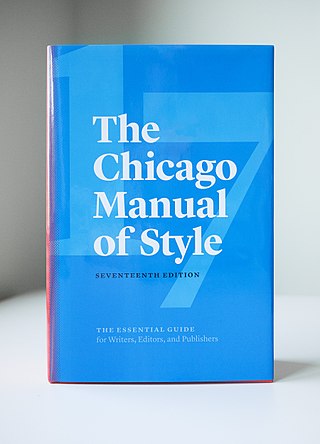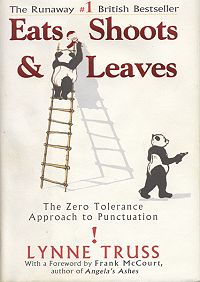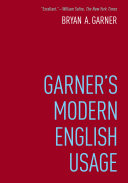In linguistics, the grammar of a natural language is its set of structural rules on speakers' or writers' usage and creation of clauses, phrases, and words. The term can also refer to the study of such rules, a subject that includes phonology, morphology, and syntax, together with phonetics, semantics, and pragmatics. There are, broadly speaking, two different ways to study grammar: traditional grammar and theoretical grammar.
Singular they, along with its inflected or derivative forms, them, their, theirs and themselves, is a gender-neutral third-person pronoun. It typically occurs with an indeterminate antecedent, in sentences such as:
A split infinitive is a grammatical construction in which an adverb or adverbial phrase separates the "to" and "infinitive" constituents of what was traditionally called the "full infinitive", but is more commonly known in modern linguistics as the to-infinitive. In the history of English language aesthetics, the split infinitive was often deprecated, despite its prevalence in colloquial speech. The opening sequence of the Star Trek television series contains a well-known example, "to boldly go where no man has gone before", wherein the adverb boldly was said to split the full infinitive, to go. Multiple words may split a to-infinitive, such as: "The population is expected to more than double in the next ten years."
Corpus linguistics is the study of a language as that language is expressed in its text corpus, its body of "real world" text. Corpus linguistics proposes that a reliable analysis of a language is more feasible with corpora collected in the field—the natural context ("realia") of that language—with minimal experimental interference. The large collections of text allow linguistics to run quantitative analyses on linguistic concepts, otherwise harder to quantify.

The Elements of Style is an American English writing style guide in numerous editions. The original was written by William Strunk Jr. in 1918, and it was published by Harcourt in 1920, comprising eight "elementary rules of usage," ten "elementary principles of composition," "a few matters of form," a list of 49 "words and expressions commonly misused," and a list of 57 "words often misspelled." E. B. White greatly enlarged and revised the book for publication by Macmillan in 1959. That was the first edition of the so-called Strunk & White, which Time recognized in 2011 as one of the 100 best and most influential books written in English since 1923.

A Dictionary of Modern English Usage (1926), by Henry Watson Fowler (1858–1933), is a style guide to British English usage, pronunciation, and writing. Covering topics such as plurals and literary technique, distinctions among like words, and the use of foreign terms, the dictionary became the standard for other style guides to writing in English. Hence, the 1926 first edition remains in print, along with the 1965 second edition, edited by Ernest Gowers, which was reprinted in 1983 and 1987. The 1996 third edition was re-titled as The New Fowler's Modern English Usage, and revised in 2004, was mostly rewritten by Robert W. Burchfield, as a usage dictionary that incorporated corpus linguistics data; and the 2015 fourth edition, revised and re-titled Fowler's Dictionary of Modern English Usage, was edited by Jeremy Butterfield, as a usage dictionary. Informally, readers refer to the style guide and dictionary as Fowler's Modern English Usage, Fowler, and Fowler's.

The Chicago Manual of Style is a style guide for American English published since 1906 by the University of Chicago Press. Its 17 editions have prescribed writing and citation styles widely used in publishing.

Linguistic prescription, or prescriptive grammar, is the establishment of rules defining preferred usage of language. These rules may address such linguistic aspects as spelling, pronunciation, vocabulary, syntax, and semantics. Sometimes informed by linguistic purism, such normative practices often suggest that some usages are incorrect, inconsistent, illogical, lack communicative effect, or are of low aesthetic value, even in cases where such usage is more common than the prescribed usage. They may also include judgments on socially proper and politically correct language use.
The grammar of the German language is quite similar to that of the other Germanic languages. Although some features of German grammar, such as the formation of some of the verb forms, resemble those of English, German grammar differs from that of English in that it has, among other things, cases and gender in nouns and a strict verb-second idea order in main clauses.

The Associated Press Stylebook, alternatively titled The Associated Press Stylebook and Briefing on Media Law, is a style and usage guide for American English grammar created by American journalists working for or connected with the Associated Press journalism cooperative based in New York City. The Stylebook offers a basic reference to American English grammar, punctuation, and principles of reporting, including many definitions and rules for usage as well as styles for capitalization, abbreviation, spelling, and numerals.

Eats, Shoots & Leaves: The Zero Tolerance Approach to Punctuation is a non-fiction book written by Lynne Truss, the former host of BBC Radio 4's Cutting a Dash programme. In the book, published in 2003, Truss bemoans the state of punctuation in the United Kingdom and the United States and describes how rules are being relaxed in today's society. Her goal is to remind readers of the importance of punctuation in the English language by mixing humour and instruction.

The Duden is a dictionary of the Standard High German language, first published by Konrad Duden in 1880, and later by Bibliographisches Institut GmbH. The Duden is updated regularly with new editions appearing every four or five years. As of December 2020, it is in its 28th edition. It is printed as twelve volumes, with each volume covering different aspects of the German language such as loanwords, etymology, pronunciation, synonyms, etc.

David Crystal, is a British linguist who works on the linguistics of English language.

The Latin adverb sic inserted after a quoted word or passage indicates that the quoted matter has been transcribed or translated exactly as found in the source text, complete with any erroneous, archaic, or otherwise nonstandard spelling, punctuation, or grammar. It also applies to any surprising assertion, faulty reasoning, or other matter that might be interpreted as an error of transcription.
Practical English Usage is a standard reference book aimed at foreign learners of English and their teachers written by Michael Swan.

Bryan Andrew Garner is an American legal scholar and lexicographer. He has written more than two dozen books about English usage and style such as Garner's Modern English Usage for a general audience, and others for legal professionals. Garner also wrote two books with Justice Antonin Scalia: Making Your Case: The Art of Persuading Judges (2008) and Reading Law: The Interpretation of Legal Texts (2012). He is the founder and president of LawProse Inc.

Garner's Modern English Usage (GMEU), written by Bryan A. Garner and published by Oxford University Press, is a usage dictionary and style guide for contemporary Modern English. It was first published in 1998 as A Dictionary of Modern American Usage, with a focus on American English, which it retained for the next two editions as Garner's Modern American Usage (GMAU). It was expanded to cover English more broadly in the 2016 fourth edition, under the present title. The work covers issues of usage, pronunciation, and style, from distinctions among commonly confused words and phrases to notes on how to prevent verbosity and obscurity. In addition, it contains essays about the English language. An abridged version of the first edition was also published as The Oxford Dictionary of American Usage and Style in 2000 and a similar version was published in The Chicago Manual of Style 16th edition in 2017. The latter includes three sections titled "Grammar", "Syntax" and "Word Usage", each with several subcategories.
A style guide is a set of standards for the writing, formatting, and design of documents. A book-length style guide is often called a style manual or a manual of style. A short style guide, typically ranging from several to several dozen pages, is often called a style sheet. The standards documented in a style guide are applicable either for general use, or prescribed use for an individual publication, particular organization, or specific field.
Michael Swan is a writer of English language teaching and reference materials. He graduated from University of Oxford with a bachelor's degree in modern foreign languages and has later gone for a postgraduate research degree. He is the founder of Swan School of English.
The Gregg Reference Manual: A Manual of Style, Grammar, Usage, and Formatting is a guide to English grammar and style, written by William A. Sabin and published by McGraw-Hill. The book is named after John Robert Gregg. The eleventh (“Tribute”) edition was published in 2010. The ninth Canadian edition, entitled simply The Gregg Reference Manual with no subtitle, was published on February 25, 2014.










